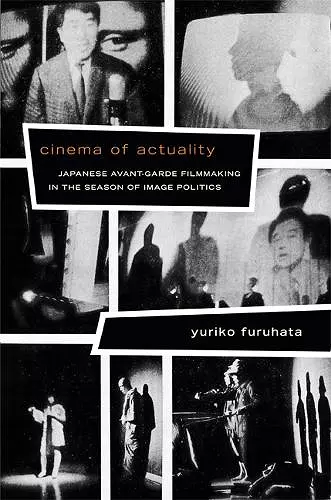Cinema of Actuality
Japanese Avant-Garde Filmmaking in the Season of Image Politics
Format:Hardback
Publisher:Duke University Press
Published:13th Sep '13
Currently unavailable, and unfortunately no date known when it will be back

During the 1960s and early 1970s, Japanese avant-garde filmmakers intensely explored the shifting role of the image in political activism and media events. Known as the "season of politics," the era was filled with widely covered dramatic events from hijackings and hostage crises to student protests. This season of politics was, Yuriko Furuhata argues, the season of image politics. Well-known directors, including Oshima Nagisa, Matsumoto Toshio, Wakamatsu Kōji, and Adachi Masao, appropriated the sensationalized media coverage of current events, turning news stories into material for timely critique and intermedial experimentation. Cinema of Actuality analyzes Japanese avant-garde filmmakers' struggle to radicalize cinema in light of the intensifying politics of spectacle and a rapidly changing media environment, one that was increasingly dominated by television. Furuhata demonstrates how avant-garde filmmaking intersected with media history, and how sophisticated debates about film theory emerged out of dialogues with photography, television, and other visual arts.
"Cinema of Actuality demonstrates that—despite the copious scholarship on Japanese films of the 1960s and 1970s—we know less about this period than we think. Yuriko Furuhata provides crucial new insights, deftly placing the films in the context of the era's media mix, while introducing us to the theoretical writings underpinning the filmmakers' creative practices. The result is a vital contribution to the history of film theory."—Abé Mark Nornes, author of Forest of Pressure: Ogawa Shinsuke and Postwar Japanese Documentary
"Cinema of Actuality is a tour de force, a potentially field-changing intervention in Japanese film studies, TV and media theory, and the study of postwar world film culture. Yuriko Furuhata shows that during the 1960s and 1970s, major political events and their portrayal in the media formed the basis for an entire Japanese cinema. At the same time, she poses vital questions about media theory and representation more broadly. This is a singularly important work."—Akira Mizuta Lippit, author of Ex-Cinema: From a Theory of Experimental Film and Video
"At last there's a book that reads the Japanese cinema of the 1960s and 1970s in a cross-media context and with a rigorous historical and theoretical eye. Elegantly and precisely argued, this is a book that is both exemplary and surprising. From manga to militant cinema, from landscape theory to pink film, Yuriko Furuhata gives readers the discursive and political history that allows a new understanding of the Japanese film and media of this era."—Miryam Sas, author of Experimental Arts in Postwar Japan: Moments of Encounter, Engagement, and Imagined Return
"Artists often make great sociological commentators, and Furuhata’s book sheds new light on the insights of these filmmakers.... [a] compelling and necessary addition to cinema scholarship." -- Lyle Sylvander * JQ Magazine *
“Studies that grapple with the complexities of cross-cultural analysis are few… the author is well qualified to achieve an excellent addition to the literature.” -- Mike Leggett * Leonardo Reviews *
“[A] remarkably researched and argued case for Japan's complex theoretical contributions to the field of cinema studies…. The totality of Furuhata's work is a benchmark of attained, wide-reaching scope that any serious academic work should ascribe to achieve.” -- Clayton Dillard * Slant Magazine *
“Furuhata convincingly sketches the intellectual and social environment that gave birth to some of Japan’s most distinctive films.” -- Alexander Jacoby * TLS *
"Adds significant depth, nuance and context to a topic that has, for good reason, long captivated an audience of cinephiles, activists and researchers." -- Steven Ridgely * Pacific Affairs *
"Furuhata … brilliantly analyses a radical movement whose effects can be traced in contemporary film, anime, manga, and television representations. Cinema of actuality sets a new standard of scholarly excellence in Japanese film studies and is a book to go on all our reading lists." -- Dolores P. Martinez * Anthro Forum *
“Cinema of Actuality highlights the many ways the cinematic avant-garde was deeply concerned with the rise of the broadcast political spectacle. This attention to the contemporaneous gives the book itself a strong feeling of ‘actuality,’ and the richly detailed contexts it offers will have a profound impact on our understanding of this ‘season of image politics.’” -- Paul Roquet * Japan Forum *
"Fascination with actuality is alive and well, in social media and on the streets, where we find old vanguards among the fresh faces of counter-politics. Although the media platforms have changed, this continuity suggests that the reach of Furuhata’s insightful analysis in this book may be far greater than the period it covers." -- Mariko Shigeta Schimmel * Monumenta Nipponica *
ISBN: 9780822354901
Dimensions: unknown
Weight: 513g
280 pages